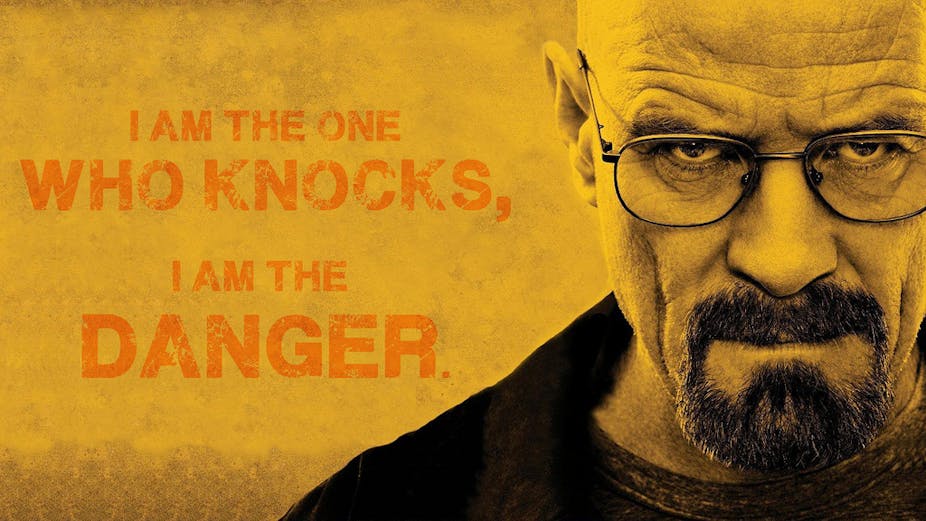WARNING: SPOILERS BELOW
Walter White came to us just when we needed him. Breaking Bad offered a world reeling from the effects of lengthy recession some glimmer of hope, but more importantly it now offers us a potential lesson in values and about ourselves. The cultural impact of the show will be more meaningfully assessed 10 years from now, when we will know if, as it seems, this is an era drawing to a close, or whether the story of the rise and fall of Heisenberg – to give White his alias – is just a blip in our popular consciousness.
We are used to epic protagonists rising from obscurity, taking the hero’s quest led by virtue and wits. We are supposed to cheer them as they triumph over adversity and evil. From Homer to Star Wars, we know the distinction between the good and the bad, the hero and the villain. Villains are defeated, and heroes prevail. But heroes don’t become villains, and we’re not supposed to cheer for the bad guy.
The genius of Breaking Bad has been the transformation. This has been the story-telling obsession of Vince Gilligan since the start, to examine the possibility that our characters aren’t etched in stone, that the transformation of an ordinary person can happen in increments, and in the very worst possible way. Unlike most modern anti-heroes, we didn’t know Walt would become a complete villain. It happened so subtly, and we have had to undertake some serious introspection along the way as we cheered, then eventually loathed, then hoped for redemption of the character at the center of this epic - the Lucifer of this not-exactly-Paradise Lost, who has fallen so far and brought so many down with him.
For many of us, the nature of our reactions to Walt and the overarching story has changed dramatically. Walt served for us as a fantasy, a dream: the geek who prevails over the bad and the brawny with wits and science. The failed father and flailing teacher who finds a niche in a world full of money and violence. The mythos of Heisenberg that reigns over the southwest corner of the land of opportunity. We were drawn in, cheering, even as the horrors began to accumulate and the body-count grew. Our basic assumptions about the utilitarian calculus justifying Walt’s every move are finally undercut as the victims of Walter’s transformation become more innocent, more sympathetic, and Walt’s ego storms forth in frightening outbursts. In this past season, the lie that Walt has used conveniently to justify his descent into evil has finally come apart. It was never about his family. It was always about him.
So now who do we cheer for?
Many have pointed out that the show would have been very short indeed had Walt made some simple decisions early on, foremost among these would have been to take the offer of employment back at Grey Matter. With it would have come a health plan, and no need for Walt’s embrace of his criminal life. But the rise of Heisenberg fed Walt’s ego, and crawling back to Grey Matter would have undermined it, so he choose the former. He could have done everything he needed to do for his family by subverting his own selfish need to prove something. We see now, poised at the end of the series, that it all comes back somehow to Grey Matter. He is set on exacting his wrath, whomever it is now aimed at, in the worst way possible.
And so now, who do we cheer for? Hank is dead, the innocents are suffering, and we hope against hope that before he goes down Walt will at least save Jesse. His family no longer need him. With fear and loathing we tensely wait for some final act to justify the madness, to redeem the man we once rooted for. This is the final lesson. That ego that drove him so deeply down into the depths must now be set aside if there is any hope. The legacy he will leave to his family, if it is to be worth anything at all, must not be in 55 gallon barrels, but in deeds. If Walt Jr. is to forgive his father, and if in death Walt is to mean anything positive to Skyler and his daughter, then the plan all along to leave some fortune must finally be forgotten, and some greater good must materialise. Money will no longer suffice, it barely matters. Walt’s calculus was wrong all along.
We will know a lot more about ourselves by our reactions to the final chapter. What is it about Walter White that compelled us, that we admired, and does any core of decency remain? Will we embrace an act of selflessness, or will we despise some final outburst of vengeance and ego? This is a moment when, as we watch the end of Breaking Bad collectively, hoping as we must for some meaning, the lesson we take reveals as much about us as the explicit expression of the artists. It is a Rorschach test of sorts, a mirror into our souls: what part of Walt is us, and has been all along? Can we use this tale to transform ourselves? What values matter in the end? Please Walt, give us some reason, don’t make this all just sound and fury, signifying nothing.

